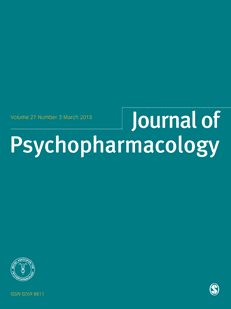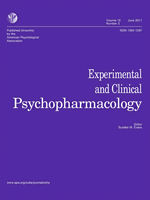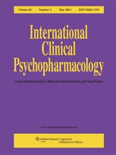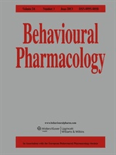
JOURNAL OF PSYCHOPHARMACOLOGY
Scope & Guideline
Bridging Research and Practice in Psychopharmacology
Introduction
Aims and Scopes
- Psychedelic Research and Therapy:
The journal has a strong emphasis on the therapeutic potential of psychedelics, including substances like psilocybin and MDMA, in treating various mental health conditions such as depression, PTSD, and anxiety. It explores both clinical and experiential aspects of these substances. - Pharmacogenomics and Personalized Medicine:
There is a growing focus on the role of pharmacogenomics in psychopharmacology, assessing how genetic variations affect individual responses to medications like antidepressants and antipsychotics, thereby promoting personalized treatment plans. - Mechanisms of Action of Psychotropic Drugs:
Research often delves into the neurobiological mechanisms through which psychotropic medications exert their effects, including studies on neurotransmitter systems, receptor interactions, and brain connectivity. - Clinical Efficacy and Safety of Antipsychotics and Antidepressants:
The journal consistently publishes findings related to the efficacy and safety profiles of traditional antipsychotics and antidepressants, evaluating their therapeutic benefits against potential side effects. - Innovative Treatment Approaches:
There is an exploration of innovative treatment strategies, including combination therapies, adjunctive treatments, and novel drug delivery methods, highlighting advancements in psychopharmacological practices. - Impact of Substance Use on Mental Health:
The journal addresses the intersection of substance use (including cannabis and alcohol) with mental health, examining how these substances impact treatment outcomes and mental health conditions.
Trending and Emerging
- Psychedelic-Assisted Therapy:
There is a significant rise in publications exploring the efficacy and safety of psychedelic-assisted therapy, particularly for conditions like PTSD and depression, reflecting a resurgence in interest in these substances as viable therapeutic options. - Integration of Technology in Psychopharmacology:
Emerging themes include the use of technology, such as telemedicine and digital health applications, in psychopharmacology, particularly in monitoring treatment response and improving patient adherence. - Microdosing and Low-Dose Psychedelics:
Research into microdosing psychedelics and the effects of low doses on mental health outcomes is gaining traction, indicating a shift towards exploring sub-perceptual doses of psychoactive substances. - Neurobiological Biomarkers for Treatment Response:
The identification of neurobiological markers that predict treatment response is becoming increasingly relevant, as personalized medicine takes precedence in psychopharmacology. - Effects of Cannabis on Mental Health:
There is an uptick in studies examining the therapeutic and adverse effects of cannabis use, especially in relation to its impact on anxiety, depression, and psychosis, reflecting societal changes in cannabis legalization and use. - Focus on Mental Health in Underserved Populations:
Emerging themes include a focus on mental health disparities and the efficacy of psychopharmacological treatments in underserved populations, highlighting the journal's commitment to inclusive research.
Declining or Waning
- Traditional Antidepressants without Novel Mechanisms:
Research focusing solely on older classes of antidepressants, such as SSRIs without exploring novel mechanisms or adjunctive therapies, has decreased, as the field increasingly prioritizes innovative approaches and psychedelics. - Longitudinal Studies without Immediate Clinical Relevance:
Studies that focus on long-term observational data without immediate clinical implications are becoming less common, as the emphasis shifts towards actionable insights and immediate therapeutic applications. - Exclusively Preclinical Studies on Drug Effects:
There has been a decline in purely preclinical studies that lack translational relevance to human conditions, as the journal favors research that directly informs clinical practice. - Research on Stigmatized Substances without Clinical Context:
Topics that investigate stigmatized substances in a purely recreational context, without addressing potential therapeutic applications or clinical implications, are less frequently published. - Pharmacotherapy for Rare Disorders:
Research focusing on pharmacotherapy for less common psychiatric disorders has become less prominent, as the journal's scope increasingly prioritizes more prevalent mental health issues with broader implications.
Similar Journals

NEUROPSYCHOPHARMACOLOGY
Shaping the Future of Mental Health through Scholarly ExcellenceNEUROPSYCHOPHARMACOLOGY is a prestigious academic journal dedicated to advancing our understanding of the intricate relationship between psychiatric disorders and pharmacological treatments. Published by SpringerNature in the United Kingdom, this leading journal has been a cornerstone in the field since its inception in 1987, with a converged publication timeline extending to 2024. With a remarkable impact factor and illustrious rankings—being positioned 19th in Psychiatry and Mental Health and 16th in Pharmacology—NEUROPSYCHOPHARMACOLOGY is recognized for its rigorous peer-reviewed research that informs clinical practice and enhances therapeutic interventions. The journal is classified in Q1 quartile categories for both Pharmacology and Psychiatry and Mental Health, highlighting its commitment to excellence. Researchers, professionals, and students are encouraged to contribute to this vital dialogue, as the journal does not currently offer open access, emphasizing the importance of curated, high-quality content. By publishing innovative studies and reviews, NEUROPSYCHOPHARMACOLOGY plays a crucial role in shaping the future of mental health treatments and understanding neurobiological mechanisms, making it an indispensable resource for those at the forefront of psychiatric research.

Middle East Current Psychiatry-MECPsych
Exploring the intersection of culture and psychiatry.Middle East Current Psychiatry (MECPsych), published by SpringerNature, is a prominent open-access journal dedicated to advancing the field of psychiatry and mental health in the Middle East and beyond. Since its establishment in 2011, MECPsych has aimed to disseminate high-quality research, reviews, and reports that capture recent developments in psychiatric science, clinical practice, and public health considerations in mental well-being. With an impact factor reflective of its growing influence and classified in the Q3 quartile for Psychiatry and Mental Health, the journal offers invaluable insights backed by rigorous peer review processes. Operating under an open access model since 2019, MECPsych ensures that its articles are freely accessible to a global readership, enhancing the visibility and application of research findings. As part of its ongoing commitment to enriching understanding in the field, MECPsych also encourages submissions that explore the unique cultural, societal, and economic factors influencing mental health across the region. This approach not only supports researchers, professionals, and students in their pursuit of knowledge but also fosters a collaborative dialogue among mental health stakeholders in the Middle East and around the world.

Neuropsychopharmacology Reports
Enhancing well-being with cutting-edge neuropsychopharmacology insights.Neuropsychopharmacology Reports is a leading open-access journal published by WILEY, dedicated to advancing the fields of clinical psychology, pharmacology, psychiatry, and mental health. Established in 2018, the journal aims to disseminate high-quality research findings, critical reviews, and innovative methodologies that elucidate the complexities of neuropsychopharmacology in enhancing mental health outcomes. With an impressive impact indicated by its Q2 rankings in several categories including Clinical Psychology and Pharmacology (medical) as of 2023, Neuropsychopharmacology Reports stands out as a vital resource for researchers, professionals, and students keen on exploring the interplay between pharmacological interventions and psychological well-being. The journal’s open-access nature ensures that critical advancements in this rapidly evolving field are readily available to a global audience, fostering collaboration and discourse among scholars and practitioners alike. Building on its indexed status with Scopus, the journal is positioned as a noteworthy contributor to ongoing discussions and developments in psychiatry and medical pharmacology.

Expert Review of Clinical Pharmacology
Advancing clinical care through expert pharmacological insights.Expert Review of Clinical Pharmacology, published by TAYLOR & FRANCIS LTD, is a leading peer-reviewed journal dedicated to the field of clinical pharmacology, with a strong focus on the development and application of pharmacological therapies in patient care. Boasting an impressive impact, the journal ranks in the first quartile across multiple categories including Medicine (miscellaneous), Pharmacology (medical), and Pharmacology, Toxicology and Pharmaceutics (miscellaneous), reflecting its influential position within the scientific community. With a Scopus ranking of #6 in General Pharmacology, Toxicology and Pharmaceutics, the journal also achieves a commendable 93rd percentile, further emphasizing its importance as a resource for researchers and clinicians alike. As it continues to publish innovative reviews and research articles from 2008 until 2024, the Expert Review of Clinical Pharmacology plays an essential role in advancing knowledge, improving clinical practice, and fostering collaboration among experts in pharmacology, thereby driving forward the field's evolution towards better patient outcomes.

EXPERIMENTAL AND CLINICAL PSYCHOPHARMACOLOGY
Pioneering Research for Clinical ExcellenceEXPERIMENTAL AND CLINICAL PSYCHOPHARMACOLOGY, published by the American Psychological Association, stands as a pivotal resource within the fields of pharmacology and psychiatry. With an ISSN of 1064-1297 and an E-ISSN of 1936-2293, this journal contributes significantly to the understanding of psychopharmacological interventions through its rich array of research articles, reviews, and clinical studies. Classified within the Q2 category in both Pharmacology and Psychiatry and Mental Health, it reflects a solid standing in academic performance, evidenced by its rankings in Scopus, where it places within the top half of its categories. Spanning from 1993 to 2024, it seeks to provide an essential platform for the dissemination of knowledge and advancements that influence clinical practice and therapeutic approaches. Although not an open-access journal, its impact on the development of evidence-based psychopharmacological treatments cannot be overstated, making it a vital resource for researchers, clinically active professionals, and students eager to stay abreast of cutting-edge developments in mental health and pharmacology.

INTERNATIONAL CLINICAL PSYCHOPHARMACOLOGY
Advancing the Science of PsychopharmacologyINTERNATIONAL CLINICAL PSYCHOPHARMACOLOGY, published by Lippincott Williams & Wilkins, stands as a pivotal peer-reviewed journal in the fields of pharmacology and psychiatry. Established in 1986, it has garnered a prominent reputation with a 2023 impact factor placing it in the Q2 category for both Pharmacology and Psychiatry and Mental Health. With an impressive Scopus ranking of #227 in the Psychiatry and Mental Health category and #114 in Pharmacology, it serves as an essential platform for researchers seeking to disseminate critical findings on psychopharmacological interventions and their clinical efficacy. The journal’s rigorous peer-review process ensures that only high-quality research is published, making it a trusted resource for professionals and students alike. By focusing on the latest advancements and evidence-based practices, the INTERNATIONAL CLINICAL PSYCHOPHARMACOLOGY contributes significantly to the understanding of mental health treatments, fostering ongoing dialogue and innovation in the discipline.

ACTAS ESPANOLAS DE PSIQUIATRIA
Illuminating the path of psychiatric excellence since 1996.ACTAS ESPANOLAS DE PSIQUIATRIA, published by the renowned JUAN JOSE LOPEZ-IBOR FOUNDATION, serves as a vital resource in the field of psychiatry and mental health, particularly within the Spanish-speaking academic community. With its ISSN 1139-9287 and E-ISSN 1578-2735, this journal has been a critical platform for disseminating high-quality research since its inception in 1996 and continues to contribute valuable insights until 2024. As a recognized journal in the Q3 category of psychiatry and mental health, it ranks 387 out of 567 in Scopus, placing it within the 31st percentile, thereby indicating a growing influence among its peers. The journal’s open access options enhance its accessibility, encouraging a broader readership to engage with contemporary research issues in mental health. Researchers, professionals, and students alike will find ACTAS ESPANOLAS DE PSIQUIATRIA essential for staying informed on the latest developments and innovations in psychiatric practice and research.

Iranian Journal of Pharmaceutical Research
Exploring innovative solutions in pharmaceutical sciences.Welcome to the Iranian Journal of Pharmaceutical Research, a pioneering publication in the field of pharmacology, toxicology, and pharmaceutics, published by BRIEFLAND. Established in 2002, this journal has been a crucial platform for disseminating innovative research and scholarly articles, contributing significantly to the advancement of pharmaceutical sciences in Iran and beyond. With an impressive trajectory leading towards a convergence of knowledge by 2024, it proudly holds a Q3 ranking in Pharmacology (Medical) and a Q2 ranking in the broader realm of Pharmacology, Toxicology, and Pharmaceutics for 2023. The journal's influence is underscored by its Scopus rank of #25/80 in General Pharmacology, Toxicology, and Pharmaceutics, placing it within the 69th percentile, therefore appealing to researchers, professionals, and students alike. Although the journal operates under a non-open access model, it remains dedicated to providing high-quality research articles that explore the latest advancements in pharmaceutical sciences, making it an essential resource for anyone involved in this vibrant field of study.

INTERNATIONAL JOURNAL OF NEUROPSYCHOPHARMACOLOGY
Pioneering insights into psychiatric disorders and treatments.The INTERNATIONAL JOURNAL OF NEUROPSYCHOPHARMACOLOGY, published by OXFORD UNIV PRESS, is a leading open-access journal in the fields of pharmacology and psychiatry, with an impressive impact factor reflecting its prominence in academic research. Since its inception in 1998, the journal has provided a crucial platform for the publication of high-quality research, offering insights into the effects of neuropharmacological agents on mental health. As of 2023, it ranks in the Q1 category for both Pharmacology and Psychiatry & Mental Health, underscoring its relevance and authority within the scientific community. With notable rankings in various medical subspecialties, it attracts contributions that advance our understanding of psychiatric disorders and therapeutic strategies. The accessible nature of the journal, following its transition to open access in 2015, has expanded its reach, making knowledge and findings readily available to researchers, professionals, and students globally. This commitment to disseminating impactful research ensures the journal remains at the forefront of neuropsychopharmacological advancements.

BEHAVIOURAL PHARMACOLOGY
Decoding the Behavioral Effects of Pharmacological AgentsBehavioural Pharmacology is a distinguished academic journal published by Lippincott Williams & Wilkins, focusing on the intricate relationship between pharmacology, psychiatry, and behavioral science. With an ISSN of 0955-8810 and an E-ISSN of 1473-5849, this journal serves as a vital platform for researchers and professionals dedicated to exploring the pharmacological mechanisms underlying behavior and mental health. Operating with a robust track record since its inception in 1992, it has established itself in the academic community, as reflected by its Q3 rankings in both the pharmacology and psychiatry categories for 2023. Additionally, the journal holds a credible position in Scopus rankings, with a percentile ranking indicative of significant contributions to the fields of pharmacology and psychiatry. Aimed at advancing knowledge and disseminating research in the behavioral pharmacology domain, this journal is an essential resource for students, researchers, and clinical professionals seeking to stay at the forefront of this rapidly evolving field. While it is not an open access journal, the rich content and research findings published here continue to foster collaboration and innovation within the community, making it a crucial reference point for current and future studies.